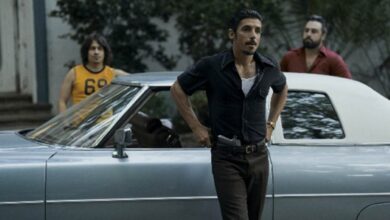Oscars 2022: The Unfulfilled Promises of “Dune”
“Dune”, by Denis Villeneuve, promises more than it delivers . This is the third review of our special on the films nominated for an Oscar in the Best Movie category

Photo: Warner Bros. Pictures
”
LatinAmerican Post | Staff
“Dune” was perhaps the most anticipated premiere of last year. This is the film adaptation of the homonymous novel by Frank Herbert. Furthermore, it was also one of the most hyped movies with an intense and constant hype campaign emphasizing its wide cast of young superstars.
In “Dune”, an intergalactic war takes place in a distant, dystopian future. The fight is for the control of the fief of Arrakis, a planet that is all a desert (a dune); and in which there is a precious commodity: spice, a fundamental substance for interstellar travel. In the middle of this conflict is the protagonist of the film: Paul. This boy is the son of a duke, from whom he learns how to be a warrior; and a woman belonging to a secret female sect, from whom he learns precognitive and mental abilities.
The narrative of the chosen one
Paul, our protagonist, is a chosen one. From the very first sequences, we see him having precognitive dreams that distress him. We also see, albeit very little, a problematic relationship with his heritage: he is, on the one hand, the heir to his father’s power, and, on the other, the messiah who will liberate a people. Those who get to know him also recite a kind of prophecy that lets us see that the young man will soon have great power that perhaps he does not want or think he deserves.
This story is known in science fiction movies: it is what triggers the plot of “Star Wars” and is the center of “Blade Runner 2049”, also directed by Denis Villeneuve. This formula, moreover, is the favorite of the most recent youth sagas such as “Harry Potter” or “The Hunger Games”. In all the previous ones we have a young protagonist who has been chosen and who, without knowing it, will be in charge of ending an oppressive villain. In some it is a dystopia of political power and in others an inexplicable evil force. In any case, our young protagonists many times have not asked for, nor do they want, the power that is attributed to them. Paul’s case is no different and, according to his father, this will make him a good leader.
In “Dune”, this happens a bit differently. When he arrives on Arrakis (the dune), our protagonist has an unplanned messianic awakening, rushed, by being exposed to the spice. While we’ve seen him train to be a good soldier before and study with his mother to be some kind of warlock, we kind of miss Paul’s transformation. Despite the fact that it lasts two and a half hours, “Dune” does not let us see the transformation of its protagonist, we do not see him change or learn anything. The truths are revealed to him and that’s it. Duna, desperate to get out of the formula (which also obeys to a certain extent to the figure of the tragic hero —so it’s not just any formula—), falls into the easy way of not developing her protagonist.
This is due, on the one hand, to a poor construction of the character (the script concentrates more on the plot due to the power of the dune than on the history of each of its characters), and, on the other, to a boring interpretation . The character of Paul is played by Timothée Chalamet, who has a rather deadpan style of acting. Although similar to the interpretation of Ryan Gosling in the much better achieved “Blade Runner 2049”, Chalamet’s role seems flat. This, coupled with the character just doing what he’s told and wandering through the film with a naïveté contrary to his supposed mental powers, makes it hard to like Paul, he’s boring.
Also read: Oscars 2022: “Don’t look up”, the comedy of the end of the world
Promises not kept
“Dune”, however, has some interesting themes. Paul’s problematic and contradictory relationship with his heritage is one of them. I suspect his relationship with one of the dune dwellers (played by Zendaya) will be another (as this is suggested to be the focus of the sequel). The tyrannical nature of the emperor (the villain) is also interesting; as well as the representation of an intergalactic feudal future. However, perhaps because of the concern to touch them all and to be faithful to the novel that inspired it, all these themes are barely suggested but not elaborated.
Paul’s relationship with his mother could be fascinating. She has great power over him and is his teacher. She is not a conventional mother figure and is conflicted at some points in the story. At the end of the film the most interesting thing happens between the two of them: Paul disobeys. This, again, does not finish developing also due to the flat interpretation of both actors.
A good adaptation of a book is not necessarily the most faithful to the work that inspires it, but rather the one that has been able to make a reading of it. In “Dune” , the main concern is the faithfulness to represent all the details that are surely developed in the book (and little explained in the film), so there is no central axis or theme around which it revolves.
Will he win the Oscar?
It probably wins all the awards in the more technical categories: Best Editing, Best Production Design, Best Special Effects, etc. The creation of the planets and the imagination of this dystopian world are perfect and visually interesting. It is probably for this aspect and for its box office receipts that this production is nominated for Best Picture. However, the ending suggests that (yes, after two and a half hours) “Dune” has not climaxed and that the best is yet to come. It will be then, when we see the sequel, when he may have a chance to win the jackpot.




